Reader question: I don't have T1D, but my boyfriend was diagnosed with LADA (after a long-standing misdiagnosis of T2D) about 8 months ago and is basically a T1D now. The first few months were rough as he figured out insulin dosage, etc. but it seems like a lot of things are going more smoothly now. I try to help by cooking delicious, blood-sugar friendly meals as often as I can. What other ways can I support his management of his diabetes? My temptation is to nag him to manage the way I would manage, and I try to resist that temptation!
What you can do to help your T1D significant other:
Tactics: checking any "small" items off the list can be HUGE for a tired T1D who doesn't have the energy for these tasks
- Create space in your luggage for extra supplies
- Discreetly carry extra low snacks in case your partner isn't prepared and sit with them while recovering
- Pick up prescriptions from the pharmacy
Emotions: Diabetes is as much mental + emotional as it is physical
- Figure out what communication boundaries work for both of you. You want to know that your partner is safe, your partner might not want to be bothered every time their CGM alarm goes off. Work together to find the middle ground.
- Acknowledge that this diagnosis effects your life as well and know that your needs are valid, too. You are BOTH on your own journeys with diabetes, even though it might not seem like you are.
- Accept that there is no "fixing" diabetes - the more you come from a place of support rather than trying to control or solve, the better for your partner and your relationship
Education: You may never truly know what it's like to live with T1D, but you can educate yourself so that you are knowledgable about your partner's day-to-day. There's a lot to know!
- Blood sugar is impacted by 50+ factors and insulin needs change from day to day based on sleep, stress, hydration, weather, activity level, etc.
- There is no one-size-fits-all solution for T1D. Your partner needs to get to know their individual body's patterns in order to develop their unique blue print.
- Know that your partner might not get a lot of in depth support from their health care providers. Encourage them to seek more support when they need it and help them with researching coaching, communities, or other endocrinologists

%20(2).jpg)

.jpg)

.jpg)